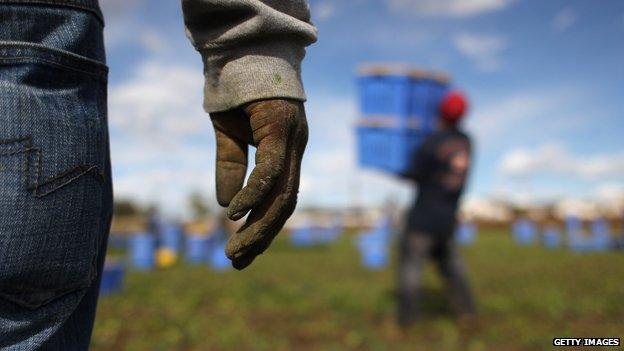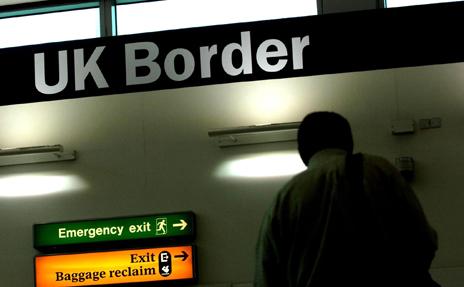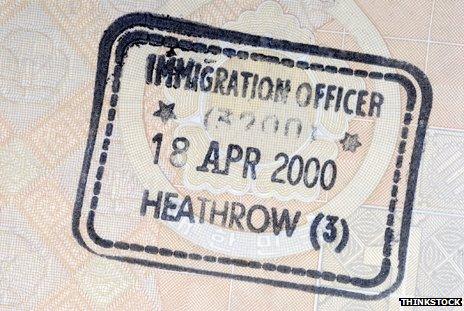More or Less: Calculating how much migrants cost or benefit a nation
- Published

Now the initial furore about Romanian and Bulgarian people being allowed to work in the UK has subsided, what does a more detailed look at immigration statistics tell us about the benefits, or otherwise, of welcoming overseas citizens? The picture is mixed.
Immigrants to the UK since 2000 have made a "substantial" contribution to public finances, a recently published report claimed.
Those from the European Economic Area (EEA - the EU plus Norway, Iceland and Liechtenstein) had made a particularly positive contribution in the decade up to 2011, the authors noted, contributing 34% more in taxes than they received in benefits and services.
"Given this evidence, claims about 'benefit tourism' by EEA immigrants seem to be disconnected from reality," one of the study's authors Christian Dustmann, professor of economics at University College London, said.
The story is slightly different for immigrants who came to the UK from outside the EEA in that period. They also put more into the public purse than they took out, but by a smaller margin of 2%.
However, studying the numbers in the UCL report more closely, another finding emerges.
And that is, that if you look at the figures for the whole of the period under study, 1995-2011, immigration has been a drain on the public purse.
To the tune of about £95bn.
So how can that be? How can the picture be so radically different if you look six years further into the past?
It's because these figures include all immigrants living in the UK at that time - so, not just recent arrivals, but people who'd been in the UK for, in some cases, decades.
This is significant because a good proportion of those people who have been in the UK for some time are likely to be older than the most recent immigrants, and so are more likely to be on benefits and using health services than those who have arrived since 2000 (who have an average age of just 26 years).
Dustmann argues therefore if you look at the fiscal contribution of all immigrants in this way, then you may not be capturing the truest picture of their total contribution to the public purse.
Certainly, focusing on the most recent immigrants gives a clear view of how much immigrants contribute to the public purse in the first few years of their stay in the UK, but it also doesn't give a complete picture, because what you are capturing is a very particular time in their lives - some of their youngest, most productive years.
To make sense of the numbers, it helps to break them down a little - to divide the net contribution to the public purse by the number of people in each group under study.
When we do that, we see that between 1995-2011, on average each EEA immigrant put about £6,000 more into the public purse than they took out.
Non-EEA immigrants each took out about £21,000 more than they put in during that period.

And this group is the biggest - non-EEA immigrants make up two thirds of the UK immigrant population. So both groups of immigrants - EEA and non-EEA - considered together, take out around £14,000 more than they put in, amounting to a deficit of around £95bn for the public purse between 1995-2011.
Of course it's well known the UK government has been running an annual deficit that's much larger than this.
That is, it's been spending more than it's got for some time now. And it's spending a large proportion of that money it doesn't have on, of course, its own people.
And we can see that clearly when we look at how much native Brits are each putting in and taking out of the public purse. On average, each native Briton took out roughly £11,000 more than they put in between 1995-2011.
So to conclude, on average only Europeans are putting in more to the UK public purse than they're taking out. At least that was the case between 1995 and 2011.
It's worth highlighting the UCL calculations are conservative, in the sense that they are likely to allocate relatively more costs to immigrants than to natives.
"For instance, while allocating costs of education of children to immigrants, we allocate the contributions of these children when they enter the labour market to natives," Dustmann says.
"We also don't include in our calculations the implicit savings made by the UK because the cost of education of immigrants is borne by the sending countries."
But there's a bigger question to consider.
We've been discussing the impact immigrants - and natives - have on the government's books.
But what about the impact they have on the economy as a whole?
You would expect the economy to grow if there are more people in the country.
But what we really want to know is, are immigrants creating added value? That is, are we all better off because of the newcomers?
Therefore, we have to think about what's happening to Gross Domestic Product (GDP) per capita of the resident population.

A few studies have considered that for the UK and other countries, but the impact is generally found to be quite small, according to Thomas Liebig, a migration specialist at the OECD.
"If you look at it in per capita terms, most studies don't find a particularly large impact and these studies depend on a whole range of assumptions and the impact will depend on how you look at things," Liebig says.
"Another specific issue is the impact on the labour market - who benefits and who loses. And globally, you find that the impact is not particularly large. That doesn't mean that it can't have a significant impact on some specific groups or sectors."
Indeed, perhaps some people feel the effects of immigration more than others.
Two groups are generally believed to be clear beneficiaries of immigration - the immigrants themselves, who move from poor countries to ones where more opportunities are on offer, and the employers of cheap labour.
Two studies from the US give us some insight into how the resident workforce might be affected, according to Carlos Vargas-Silva, an economist at the Migration Observatory at Oxford University.
One, by George Borjas of the Harvard Kennedy School, makes the point that migrants who move to the US reduce the wages of competing workers.
"Employers are going to benefit from migration because they are going to pay lower wages than before," Vargas-Silva says, explaining the study's findings. "But native workers are going to be competing with those migrants, and they are going to be negatively affected - their wages are going to be lower."

Mexican migrant workers in the US state of Colorado
But the work of another immigration expert in the US, Giovanni Peri from the University of California, suggests immigrants can help boost the prospects of native workers.
"Before, you could have a native person doing construction work," Vargas-Silva says. "But then you have more Mexican workers going in there, working in construction and then these native workers become supervisors and that native person has become more productive because of the existence of the migrant workers."
So we've considered both the fiscal and aspects of the economic impact of immigrants. But experts agree it's hard to capture the true picture, without making a lot of assumptions.
There are many things you can measure, and you can measure them in many different ways, making many different assumptions.
And of course it's not just a question of economics and numbers. There are less tangible effects to consider. The impact on culture, on community, for example - important considerations, which are difficult to measure.
Follow @BBCNewsMagazine, external on Twitter and on Facebook, external